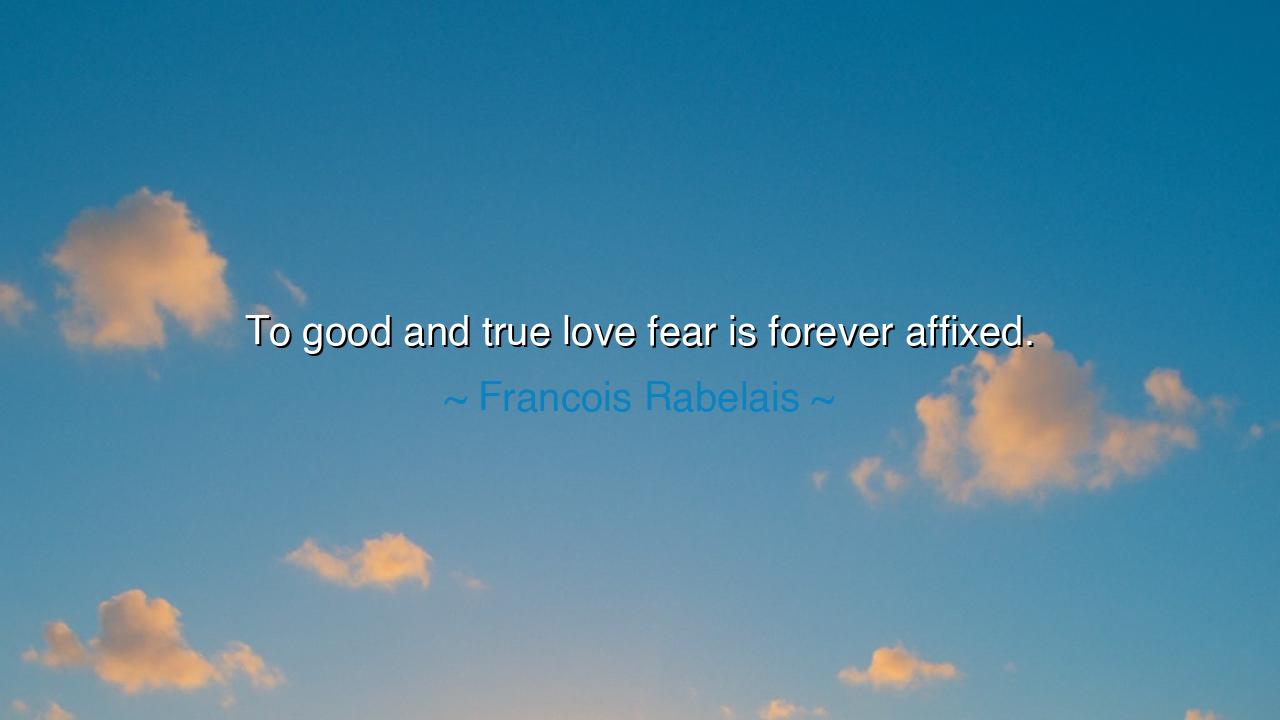
To good and true love fear is forever affixed.






"To good and true love fear is forever affixed." These words, spoken by the esteemed Francois Rabelais, offer a profound reflection on the nature of love, one that transcends the romantic ideals often celebrated in our society. Rabelais, through his wisdom, teaches us that true and authentic love is never free from fear—fear of loss, fear of rejection, fear of betrayal, and fear of the unknown. Love, especially the deepest and most genuine love, is marked by vulnerability, and with that vulnerability comes the inevitable presence of fear. To love is to risk—to place your heart in the hands of another, knowing full well that there are no guarantees. It is in this surrender that love finds its true strength, for it is through fear that we come to understand the depth of our emotions and the strength of our commitment.
In the wisdom of the ancients, this idea of fear and love being intertwined was well understood. Plato, in his Symposium, spoke of Eros as both a force that connects us to beauty and truth, and yet a force that leaves us vulnerable to heartache and loss. Love, to the ancients, was not something that existed in isolation; it was bound to the human condition, which included both joy and sorrow. Love’s true nature, as Rabelais suggests, is a reflection of this balance between devotion and fear. When we love truly and deeply, we are opened to the possibility of loss, and it is through this fear that love grows more meaningful. For love without fear would be shallow, lacking the depth that comes with the willingness to be vulnerable.
Consider, for example, the love between Antony and Cleopatra, whose relationship was one of profound passion and political complexity. Their love was genuine, yet it was always haunted by the fear of political intrigue, betrayal, and the looming presence of enemies who would destroy their reign. They were not free from fear; instead, they lived with it as a constant companion, knowing that their love, and their political power, could be taken from them at any moment. Yet, despite these fears, they chose to continue in their love, risking everything for the sake of union and passion. Their story shows us that true love is not without fear, but that it is in choosing love despite the fear that we find its most profound expression.
In the same way, Romeo and Juliet’s love was a deep, all-consuming force that defied the boundaries of their warring families. Their love was true and pure, but it was affixed with fear—the fear of being discovered, the fear of the consequences, and, ultimately, the fear of losing one another. Their love became even more intense because of the uncertainty and the danger that surrounded it. The fear of separation fueled their love, making each moment together feel precious, and it was in their final moments that their love, though tragic, became eternal. Theirs was not a love that existed in a world without fear, but one that was shaped by the fears of their environment, a love that transcended death itself.
Rabelais's insight points to a universal truth: in true love, fear is not a sign of weakness or something to be avoided, but a companion to be acknowledged. To love deeply is to risk everything—your heart, your peace, and your very future. This fear does not make the love less pure, but makes it more real. It is in the face of fear that we see the strength of our commitment, for it is not in the absence of fear that love grows, but in the courage to love despite it. The strength of a relationship is not found in the perfection of the love, but in the willingness to face fear together and still stand by one another, regardless of the challenges that lie ahead.
The lesson here is clear: fear is not the enemy of love, but a crucial part of its foundation. If you seek to love truly and deeply, be prepared to embrace the fear that comes with it. Do not shy away from the vulnerability that love demands, for it is in that vulnerability that you will find the deepest connections and the most fulfilling relationships. Fear teaches us the value of the love we share, and it reminds us of what is at stake—our hearts, our trust, and our future. It is through this surrender that love becomes a force greater than ourselves, something that binds us to others in the most powerful and enduring way.
In your own life, recognize that love, in its most genuine form, will always be accompanied by fear. The fear of losing someone, the fear of being vulnerable, and the fear of the unknown are all part of the human experience. Rather than running from these fears, embrace them. Use them as reminders of the deep bond you share with those you love, and let them strengthen your commitment. When you love, you are engaging in a beautiful, terrifying, and courageous act—an act that reveals the depth of your humanity and the power of your connection to others. Let fear be a guide, not a hindrance, for it is in facing it that love becomes most meaningful and enduring.






AAdministratorAdministrator
Welcome, honored guests. Please leave a comment, we will respond soon